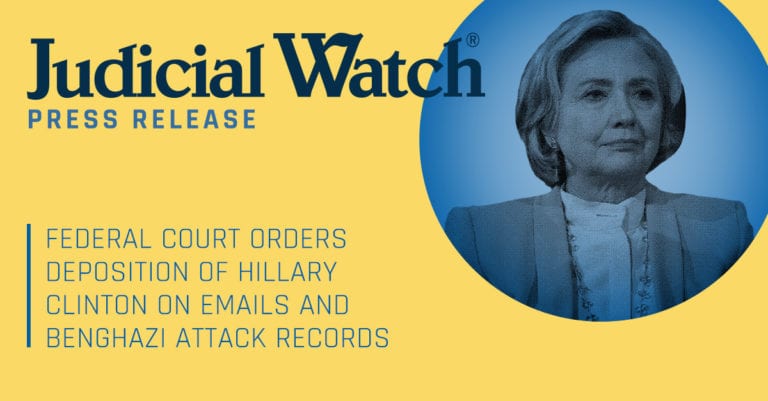March 2, 2020
Court: 'It is Time to Hear Directly from Secretary Clinton'
(Washington, DC) Judicial Watch today announced that U.S. District Court Judge Royce C. Lamberth granted Judicial Watch's request to depose former Secretary of State Hillary Clinton about her emails and Benghazi attack documents. The court also ordered the deposition of Clinton's former Chief of Staff, Cheryl Mills and two other State Department officials.
Additionally, the court granted Judicial Watch's request to subpoena Google for relevant documents and records associated with Clinton's emails during her tenure at the State Department.
The ruling comes in Judicial Watch's lawsuit that seeks records concerning "talking points or updates on the Benghazi attack" (Judicial Watch v. U.S. Department of State (No. 1:14-cv-01242)). Judicial Watch famously uncovered in 2014 that the "talking points" that provided the basis for Susan Rice's false statements were created by the Obama White House. This Freedom of Information Act (FOIA) lawsuit led directly to the disclosure of the Clinton email system in 2015.
In December 2018, Judge Lamberth first ordered discovery into whether Secretary Clinton's use of a private email server was intended to stymie FOIA; whether the State Department's intent to settle this case in late 2014 and early 2015 amounted to bad faith; and whether the State Department has adequately searched for records responsive to Judicial Watch's request. The court also authorized discovery into whether the Benghazi controversy motivated the cover-up of Clinton's email. The court ruled that the Clinton email system was "one of the gravest modern offenses to government transparency." The State and Justice Departments continued to defend Clinton's and the agency's email conduct.
Judge Lamberth today overruled Clinton's and the State and Justice Department's objections to limited additional discovery by first noting:
Discovery up until this point has brought to light a noteworthy amount of relevant information, but Judicial Watch requests an additional round of discovery, and understandably so. With each passing round of discovery, the Court is left with more questions than answers.Additionally, Judge Lamberth said that he is troubled by the fact that both the State Department and Department of Justice want to close discovery in this case:
[T]here is still more to learn. Even though many important questions remain unanswered, the Justice Department inexplicably still takes the position that the Court should close discovery and rule on dispositive motions. The Court is especially troubled by this. To argue that the Court now has enough information to determine whether State conducted an adequate search is preposterous, especially when considering State's deficient representations regarding the existence of additional Clinton emails. Instead, the Court will authorize a new round of discoveryWith respect to Clinton, the court found that her prior testimony, mostly through written sworn answers, was not sufficient:
The Court has considered the numerous times in which Secretary Clinton said she could not recall or remember certain details in her prior interrogatory answers. In a deposition, it is more likely that plaintiff's counsel could use documents and other testimony to attempt to refresh her recollection. And so, to avoid the unsatisfying and inefficient outcome of multiple rounds of fruitless interrogatories and move this almost six-year-old case closer to its conclusion, Judicial Watch will be permitted to clarify and further explore Secretary Clinton's answers in person and immediately after she gives them. The Court agrees with Judicial Watch – it is time to hear directly from Secretary Clinton."Judicial Watch uncovered the Clinton email scandal and we're pleased that the court authorized us to depose Mrs. Clinton directly on her email conduct and how it impacted the people's 'right to know' under FOIA," stated Judicial Watch President Tom Fitton.

No comments:
Post a Comment
Note: Only a member of this blog may post a comment.